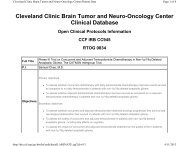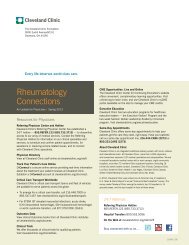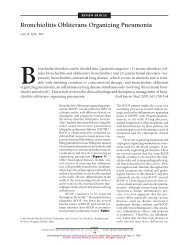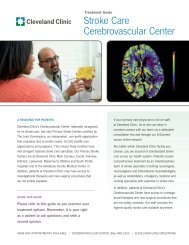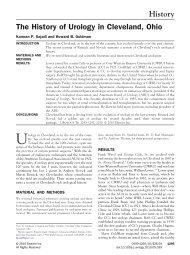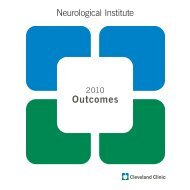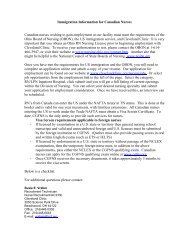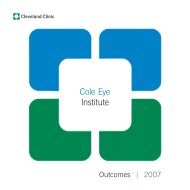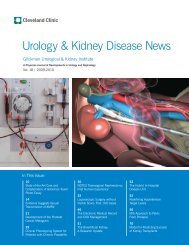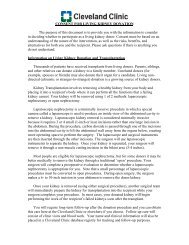Brain Tumor and Neuro-Oncology Center - Cleveland Clinic
Brain Tumor and Neuro-Oncology Center - Cleveland Clinic
Brain Tumor and Neuro-Oncology Center - Cleveland Clinic
You also want an ePaper? Increase the reach of your titles
YUMPU automatically turns print PDFs into web optimized ePapers that Google loves.
24<br />
BTNC Laboratory Research/Innovations (continued)<br />
publicly traded companies. What these companies<br />
have in common are novel drugs that are close to or<br />
in clinical trial, <strong>and</strong> that are rationally designed to be<br />
effective against malignant gliomas given the molecular<br />
<strong>and</strong> genetic makeup of these tumors. These drugs are<br />
targeted against molecules such as EGFR, mTOR/Akt,<br />
STAT3 <strong>and</strong> Raf-1 kinase. Our first translational clinical<br />
trial is with Tarceva/OSI-774, a selective EGFR kinase<br />
inhibitor small-molecule drug. This Phase II trial showed<br />
an encouraging rate of tumor responses <strong>and</strong> disease<br />
stabilization. In combination with work done in our<br />
preclinical models, this clinical trial raised important<br />
questions regarding the ability of the drug to penetrate<br />
the blood-brain barrier. As a result of these observations,<br />
we launched a follow-up trial in which patients undergo<br />
a tumor biopsy while receiving the drug. By analyzing<br />
the effects of Tarceva on the tumor tissues, we will<br />
be able to determine whether response to this drug<br />
depends primarily upon its ability to reach its intended<br />
target in the tumor.<br />
The center has also worked closely with other<br />
laboratories at Clevel<strong>and</strong> <strong>Clinic</strong> to help develop novel<br />
therapeutics that may have application for patients<br />
with malignant brain tumors. We have evaluated<br />
methods for improving immune response to gliomas (in<br />
collaboration with James Finke, PhD, of the Department<br />
of Immunology in LRI), underst<strong>and</strong>ing the role of<br />
NFkB in regulating glioma cell migration <strong>and</strong> exploring<br />
the use of a new drug that may sensitize gliomas to<br />
temozolomide (in collaboration with Stanton Gerson,<br />
MD, Director of the Case Comprehensive Cancer<br />
<strong>Center</strong>). Our efforts have included collaborations with<br />
investigators who have traditionally worked outside the<br />
field of malignant brain tumors, including Qing Wang,<br />
PhD (Department of Molecular Cardiology, LRI), with<br />
whom we are investigating the role of a newly defined<br />
tumor angiogenesis gene.<br />
Weil Laboratory<br />
Gliomas <strong>and</strong> Glioblastomas The Weil Laboratory<br />
continues its work in genomic <strong>and</strong> protein profiling of<br />
BRAIN TUMOR AND NEURO-ONCOLOGY CENTER<br />
brain tumors. This is very time-consuming, laborious<br />
work – one tumor at a time – but it is rewarding in terms<br />
of gaining a richer <strong>and</strong> more nuanced underst<strong>and</strong>ing of<br />
how these tumors may develop, progress <strong>and</strong> respond to<br />
therapy, especially with respect to finding new targets.<br />
Additional work continues on deciphering the internal<br />
genetic <strong>and</strong> protein differences of malignant gliomas,<br />
using a variety of molecular genetic <strong>and</strong> proteomic<br />
methods. This is a long-term project that will proceed<br />
over a number of years, gaining strength <strong>and</strong> nuance as<br />
more tissues are studied <strong>and</strong> variations accounted for.<br />
For example, Khatri RG, Navaratne K, Weil RJ. “The<br />
Role of a Single Nucleotide Polymorphism of MDM2<br />
in Glioblastoma.” Journal of <strong>Neuro</strong>surgery, November<br />
2008, details how a single-nucleotide polymorphism<br />
(SNP), which is a normal variant in the DNA sequence<br />
encoding a protein, can lead to altered signaling of<br />
that or other proteins. In this case, the G allele is<br />
expressed more commonly in patients with glioblastoma<br />
multiforme (GBM), <strong>and</strong> this leads to higher levels<br />
of MDM2, irrespective of the levels of Tp53, which<br />
normally controls MDM2. Higher levels of MDM2,<br />
which acts as an oncogene (a tumor-promoting gene),<br />
are known to enhance tumor growth in many cancers,<br />
including GBM. This work suggests that a common SNP<br />
variant, which anyone may have, <strong>and</strong> which would not<br />
cause problems in the normal cell, may enhance cancer<br />
in those patients who develop a GBM.<br />
<strong>Brain</strong> Metastasis Metastatic tumors to the brain, which<br />
occur in up to 200,000 people per year, represent a<br />
significant source of neurological debility <strong>and</strong> premature<br />
death, <strong>and</strong> are a second clinical <strong>and</strong> research focus of<br />
this laboratory effort.<br />
Support from the Burkhardt Chair permitted preliminary<br />
work in proteomics of breast cancer metastasis that<br />
supported a successful grant application. Dr. Robert<br />
Weil is Clevel<strong>and</strong> <strong>Clinic</strong>’s principal investigator on<br />
a recently awarded Department of Defense <strong>Center</strong><br />
of Excellence (COE) grant, five years in length <strong>and</strong>



